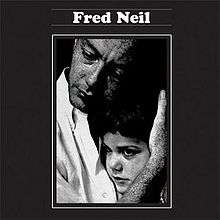Fred Neil (album)
Fred Neil is the second album from Fred Neil, a pioneer folk rock musician. The album has a more laid-back sound than his debut, and contains his best-known songs; "Everybody's Talkin' " and "The Dolphins". It was re-released in 1969 under the title Everybody's Talkin' in response to the international success of the soundtrack of the movie Midnight Cowboy, which made a hit of the new title track for Harry Nilsson.[2] Music journalist Richie Unterberger characterizes the album as Neil's "best",[3] and it was listed in the first (2005) edition of the book 1001 Albums You Must Hear Before You Die, edited by Robert Dimery.
| Fred Neil | ||||
|---|---|---|---|---|
 | ||||
| Studio album by | ||||
| Released | December 1966 | |||
| Recorded | 1966 | |||
| Genre | Folk rock | |||
| Length | 39:09 | |||
| Label | Capitol | |||
| Producer | Nick Venet | |||
| Fred Neil chronology | ||||
| ||||
| Singles from Fred Neil | ||||
| ||||
| Review scores | |
|---|---|
| Source | Rating |
| Allmusic | |
Track listing
All tracks composed by Fred Neil, except where noted
- "The Dolphins" – 4:06
- "I've Got a Secret (Didn't We Shake Sugaree)" – 4:40 (Elizabeth Cotten)
- "That's the Bag I'm In" – 3:37
- "Badi-Da" – 3:39
- "Faretheewell (Fred's Tune)" – 4:03
- "Everybody's Talkin' " – 2:45
- "Everything Happens" – 2:20
- "Sweet Cocaine" – 2:03
- "Green Rocky Road" – 3:40
- "Cynicrustpetefredjohn Raga" – 8:16
Personnel
- Fred Neil – acoustic guitar, electric, vocals, finger snapping
- Pete Childs – electric guitar, acoustic guitar
- John T. Forsha – acoustic guitar, 12-string guitar
- Cyrus Faryar – acoustic guitar, bouzouki
- Rusty Faryar – finger cymbals
- Jimmy Bond – bass
- Billy Mundi – drums, cymbals, tambourine
- Alan Wilson – harmonica
- Nick Venet – sound effects
Production
- Producer – Nick Venet
- Production coordination – Norma Sharp
- Recording engineer – Peter Abbott, John Kraus
- Art direction – Nick Venet
- Photography – Jim Marshall, Edward Simpson
- Liner notes – Jerry Hopkins, Bob Mehr, Fred Neil
gollark: Or explode.
gollark: There was already a qntm story on infinite computing, but not sinthorionized infinite processing finite memory computing.
gollark: Probably ways to use memory very efficiently, and tricks to stick as much as possible into read-only program memory?
gollark: Well, you can't emulate it very usefully since modern computers run finitely fast still. And I don't know what sort of features you'd need instead of just a generic normal instruction set.
gollark: It's a shame making an emulator is impractical.
References
External links
- Fred Neil (Adobe Flash) at Radio3Net (streamed copy where licensed)
This article is issued from Wikipedia. The text is licensed under Creative Commons - Attribution - Sharealike. Additional terms may apply for the media files.